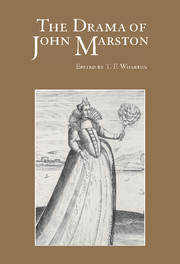Book contents
- Frontmatter
- Contents
- Notes on contributors
- Acknowledgements
- Note on the text
- Introduction
- 1 John Marston at the ‘mart of woe’: the Antonio plays
- 2 John Marston: a theatrical perspective
- 3 Varieties of fantasy in What You Will
- 4 Safety in fiction: Marston's recreational poetics
- 5 Insatiate punning in Marston's courtesan plays
- 6 Touching the self: masturbatory Marston
- 7 ‘Two parts in one’: Marston and masculinity
- 8 The Malcontent: hunting the letter
- 9 The Dutch Courtesan and the profits of translation
- 10 Sexual politics in Marston's The Malcontent
- 11 Marston: censure, censorship, and free speech
- 12 Ill-mannered Marston
- Index
6 - Touching the self: masturbatory Marston
Published online by Cambridge University Press: 01 October 2009
- Frontmatter
- Contents
- Notes on contributors
- Acknowledgements
- Note on the text
- Introduction
- 1 John Marston at the ‘mart of woe’: the Antonio plays
- 2 John Marston: a theatrical perspective
- 3 Varieties of fantasy in What You Will
- 4 Safety in fiction: Marston's recreational poetics
- 5 Insatiate punning in Marston's courtesan plays
- 6 Touching the self: masturbatory Marston
- 7 ‘Two parts in one’: Marston and masculinity
- 8 The Malcontent: hunting the letter
- 9 The Dutch Courtesan and the profits of translation
- 10 Sexual politics in Marston's The Malcontent
- 11 Marston: censure, censorship, and free speech
- 12 Ill-mannered Marston
- Index
Summary
John Marston begins the prefatory letter to his 1604 comedy Parasitaster, or the Fawn with a disingenuous bit of self-analysis and strategic self-positioning vis-à-vis his ‘Equal Reader’:
I have ever more endeavoured to know myself than to be known of others, and rather to be unpartially beloved of all, than factiously to be admired of a few; yet so powerfully have I been enticed with the delights of poetry, and (I must ingeniously [i.e. ingenuously] confess) above better desert so fortunate in these stage-pleasings, that (let my resolutions be never so fixed to call mine eyes into myself) I much fear that most lamentable death of him,
Qui nimis notus omnibus, Ignotus moritur sibi.
– Seneca.The move is to disarm those critics who would not be even-handed (or ‘equal’) by professing a deeply introspective and self-critical tendency that renders further scrutiny of this particular ‘stage-pleasing’ redundant. Marston also announces his philosophical allegiance with the Stoics, ancient and modern, the familiar burden of whose counsel is Nosce teipsum, Know thyself, and he opposes the strict virtues of self-knowing to the delightful blandishments of Dame Poesy. Even as he sets up knowledge as the higher goal, however, the very existence of this preface asserts his intention to continue his career on the public stage, to persist in his ‘self-hindering labours’. Why should Marston make such a point of simultaneously aspiring to the commonly approved goal of self-knowledge and revealing his resistance to it?
- Type
- Chapter
- Information
- The Drama of John MarstonCritical Re-Visions, pp. 100 - 123Publisher: Cambridge University PressPrint publication year: 2001

